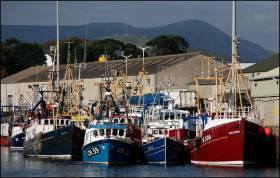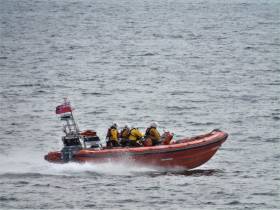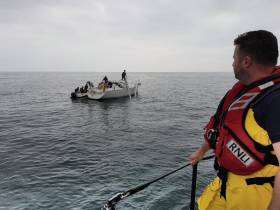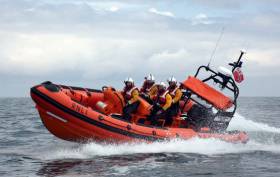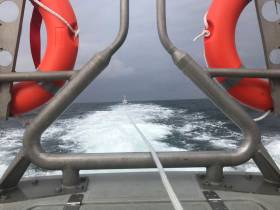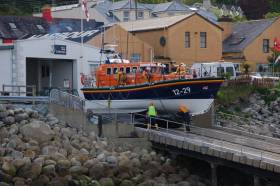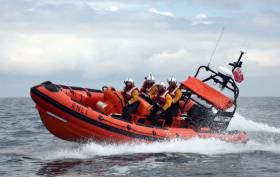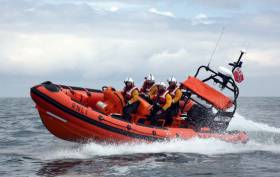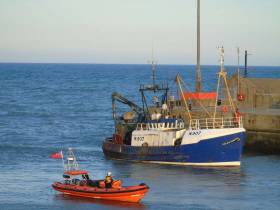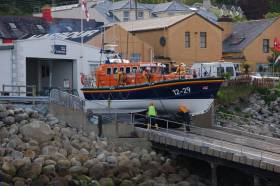Displaying items by tag: Kilkeel
Kilkeel Makes Waves With First Woman Harbour Master
Co Down woman Danielle Rooney has started her “dream job” as harbour master at Kilkeel, as The Irish News reports.
The 28-year-old is believed to be the first woman to hold such a role within the Northern Ireland Fisheries Harbour Authority.
She succeeds Michael Young, who has moved down the coast to Carlingford Harbour in Co Louth.
Rooney will be sharing her harbour duties with her existing role as station officer for Kilkeel Coastguard.
“Safety is a big priority for me so combining that with my great passion for the water hopefully will bring success for the harbour,” she says.
The Irish News has more on the story HERE.
Kilkeel Lifeboat Races To Speedboat Breakdown In Carlingford Lough Busy With Shipping
Kilkeel’s volunteer lifeboat crew worked fast to help clear a speedboat with engine troubles from a busy shipping lane yesterday afternoon (Tuesday 27 August).
The 16ft Bayliner, with one person on board, had broken down in Carlingford Lough and was in danger from incoming and outgoing shipping traffic, according to Kilkeel RNLI.
Kilkeel’s inshore lifeboat launched at 1.10pm headed south along the Co Down coast, and on arrival at the scene they found that the speedboat has been restarted.
Checking that the skipper was fine, they ensured there were no further issues before escorting the skipper back to his mooring in Greencastle.
The previous evening, Carrybridge RNLI’s inshore lifeboat Douglas Euan & Kay Richards and rescue water craft were launched to a vessel with its own engine difficulties some two miles downstream of the River Erne hamlet.
When the lifeboats arrived on scene, the casualty vessel — with two person on bard — was found floating close to the shoreline.
Once those on board were found to be well, a volunteer from the rescue water craft boarded their vessel to help set up a tow line and it was brought back to its private berth in the hamlet.
Carrybridge RNLI helm Chris Cathcart later advised all boat users: “Before setting out on your journey, please plan your route and carry out regular checks of their vessels. Also have a means of calling for assistance if you find yourself in trouble.
“If you see someone in trouble on the water or are in difficulties yourself, the number to dial is 999 or 112 and ask for the coastguard.”
Dun Laoghaire Lifeboat Launches To Yacht Dismasted Off Dalkey Island
Dun Laoghaire RNLI launched to a 34ft yacht unexpectedly dismasted while sailing near Dalkey Island yesterday afternoon (Sunday 25 August).
The skipper aboard the yacht was able to call the coastguard by VHF radio, and the volunteer lifeboat crew were requested to launch the all-weather Anna Livia at 2.15pm in calm conditions, Dun Laoghaire RNLI reports.
Once on the scene, the lifeboat crew checked that the skipper was safe and uninjured, then he and his yacht were towed back to Dun Laoghaire.
Speaking after the callout, Dun Laoghaire RNLI’s coxswain Mark McGibney said: “In this situation where the yacht unexpectedly dismasted, the skipper was able to alert the coastguard as thankfully he had a backup handheld VHF radio. It is also essential to always carry a means of communication.”
Hours before, Larne RNLI was requested to launch by Belfast coastguard to reports of a sinking vessel with two people on board.
Launching both of their lifeboats, Larne RNLI’s volunteer crew made their way towards the casualty vessel’s reported position, just outside of Larne Harbour.
While en route, the inshore lifeboat Terry was stopped by a passing pleasure craft which reported they had recovered the two people from the casualty vessel, who were found to be safe and well and were returned to shore on the all-weather lifeboat.
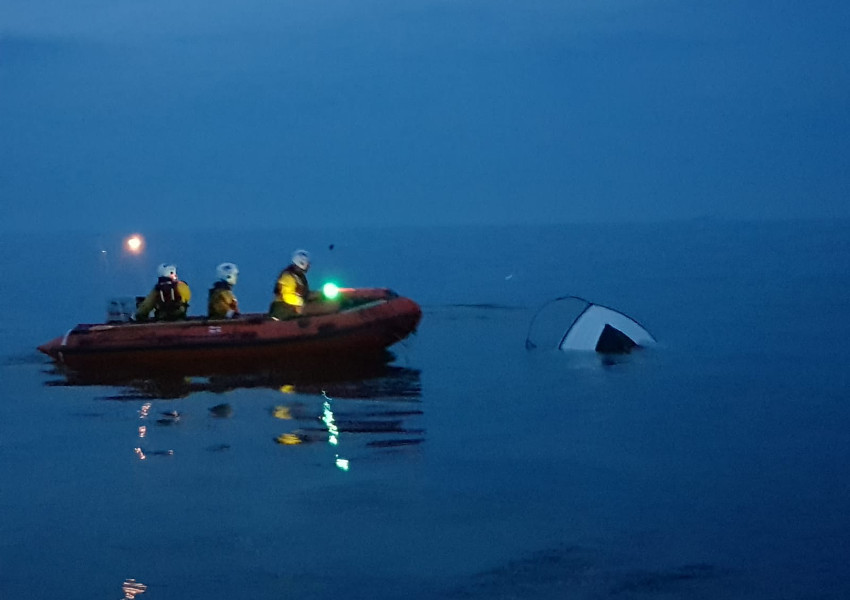
Later both lifeboats were requested to survey the casualty vessel to see if anything could be salvaged — but by then it was mostly submerged, as Larne RNLI reports.
Earlier in this Bank Holiday weekend for Northern Ireland, Kilkeel RNLI launched late on Friday (23 August) to attend a 10m yacht with two on board which had become stranded with a rope in the propeller.
Kilkee RNLI says the volunteer crew located the yacht Villa Vilja — which was on passage from Tromso, Norway to the Caribbean — seven miles north-east of Kilkeel in freshening conditions.
And with the yacht tossing about in the rough seas, the lifeboat helm brought the lifeboat safely aside and a crew member boarded the yacht to check all was well to establish a tow.
Despite the challenging conditions, the yacht was brought safely into Kilkeel Harbour where the local coastguard team ensured it was safely and securely berthed at the pontoon.
Kilkeel RNLI lifeboat operations manager John Fisher said: “The transfer of a crew member to another vessel is a manoeuvre the crew often practice but with both boats being tossed about, the transfer was particularly difficult — but was managed, as usual, in a very safe professional manner and we wish the sailors a safe onward passage to the Caribbean.”
Kilkeel Lifeboat Rescues Two People On Stranded French Yacht
Kilkeel RNLI’s volunteer crew launched at 1.20pm yesterday (Sunday 23 June) to go to the aid of the 44ft French yacht with two people onboard that was stranded two miles off Annalong Harbour in Co Down.
In fresh conditions with good visibility, the lifeboat volunteers found that the yacht had become stranded due to a rope in the propeller.
The crew, with Gary Young as helm, managed to retrieve the rope and free the yacht.
A crew member went aboard the yacht to check everything was well and finding everything was in order, he returned to the lifeboat and the yacht went on its way to continue its journey north.
Speaking following the callout, volunteer press officer Leslie Campbell said: “As we approach the summer months, we would remind all sea users regardless of their activity to always respect the water.
“Always wear a lifejacket, always carry a means of communication and always let someone on the shore know where you are going and what time you will be due back.
“Should you get into difficulty or see someone in trouble dial 999 or 112 and ask for the coastguard.”
Wicklow Lifeboat Assists Fishing Vessel With Engine Failure
Wicklow RNLI volunteers were alerted by pager at 1.05pm on Friday afternoon (12 April) following a launch request to assist a fishing boat with engine failure.
The all-weather lifeboat Jock and Annie Slater put to sea shortly before 1.15pm under the command of coxswain Nick Keogh and proceeded towards the vessel, which was reported to be 23 miles north-east of Wicklow Harbour.
The lifeboat was alongside the 10-metre fishing boat an hour later. Conditions in the area were good, with south-easterly Force 3 winds.
The fishing vessel with three crew had developed mechanical problems and had lost propulsion. A towline was secured, and the vessel was towed back towards Wicklow over the next three-and-a-half hours, being secured safely alongside the North Quay shortly before 6pm.
This was the third callout since the all-weather lifeboat Jock and Annie Slater went on station at Wicklow on Friday 5 April.
Earlier in the week, Kilkeel RNLI’s volunteer crew launched at 4.20pm on Wednesday (10 April) to respond to a call from the skipper of a fishing boat that a semi-submerged kayak was adrift at Leestone Point, north east of Kilkeel Harbour.
Conditions were good and the crew arrived quickly on scene. On examination of the kayak, the crew found there was an algae growth on her bottom and no signs that it had been recently occupied.
With no reports of a missing kayaker, the kayak was taken on board the lifeboat which then returned to the station. Kilkeel Coastguard were in attendance.
Speaking afterwards, John Fisher, Kilkeel RNLI lifeboat operations manager, said: “It is important that if a small craft is lost or abandoned that it is reported to the coastguard. This will prevent any further reports by concerned members of the public or other persons.”
Lifeboats from Clogherhead, Newcastle and Kilkeel were involved in the search for a woman missing in Carlingford Lough at the weekend, which came to a sad end yesterday afternoon (Monday 18 March) with the discovery of a body in the water off Greenore.
Newcastle RNLI was tasked to divert from a morning training exercise on the Co Down coast to join the major search operation which began on Sunday (17 March), concentrating on the entrance to Carlingford Lough and outlying islands.
During this search the all-weather lifeboat located a casualty in the water and, working with volunteer lifeboat crews from Clogherhead and Kilkeel RNLI, the casualty was taken ashore to Greenore Harbour by the Kilkeel lifeboat and placed in the care of An Garda Síochána.
The casualty was shortly after confirmed to be the remains of Ruth Maguire from Newcastle, who went missing during a hen party in Carlingford on Saturday night (16 March).
Speaking following the search, Newcastle RNLI coxswain Nathan Leneghan said: “On behalf of Newcastle RNLI I wish to express our deepest sympathy to the family and friends of the woman who was recovered from the water this afternoon.
“The thoughts and prayers of the everyone involved in the search are with them at this sad time. I also wish to commend the volunteer crews for their commitment and professionalism.”
Kilkeel RNLI lifeboat operations manager John Fisher added: “This was not the outcome we or the family wanted and at this difficult time our thoughts and prayers are with the family and friends of the casualty.
“At this time I would also like to thank the volunteer crew for their commitment and energy. We train for such an incident but always pray that it has a better outcome.”
Kilkeel Lifeboat Responds To Early-Hours Mayday From Fishing Vessel Crew
#Lifeboats - Kilkeel’s RNLI volunteers responded to a Mayday in the early hours of yesterday morning (Sunday 24 February) after a fishing vessel lost propulsion about half a mile off Kilkeel Harbour in very foggy conditions.
The crew, including helm Gerry Smyth, Andrew McConnell, Mark McCullough and Robert Tomkins, launched their inshore lifeboat and responded to the Mayday call at 5.40am.
The vessel was quickly located and having spoken to the skipper, the helm decided to put crew member Andrew McConnell aboard to safely secure a tow rope and safely tow in the vessel, with the local coastguard team assisting in berthing. By 6.25am the crew had returned safely to the boathouse.
Speaking following the call-out, Kilkeel RNLI helm Gerry Smyth said it was “something our volunteers train for on a regular basis but this time the foggy conditions and the low tide made the tow more difficult than usual.
“The lifeboat crew were delighted to help and handled the call out in a thoroughly professional manner. We wish the fishermen well.”
Kilkeel RNLI Treasurer Retires After 25 Years Of Service
Stanley Tomkins, treasurer for the Kilkeel RNLI volunteer crew, is to retire after 25 years’ service at the Co Down lifeboat station.
Tomkins, a retired bank manager, was recently awarded the British Empire Medal for his charitable work in the local community.
Over the past 25 years he been the treasurer for Kilkeel RNLI, and he has now decided to step down to devote more time to his other interests.
John Fisher, Kilkeel RNLI lifeboat operations manager, said: “We thank Stanley for his dedication and his energy over the past 25 years. We shall miss his steady hand on the financial rudder and wish him well for the future.”
Kilkeel Lifeboat Launches To Fisherman Taken Ill
#RNLI - Kilkeel RNLI’s volunteer crew launched their inshore lifeboat at 7.55pm yesterday evening (Thursday 26 July) after a crew member of a fishing boat was reported unwell and in need of medical attention.
Winds were blowing 3 to 4 knots with a choppy sea and good light as the lifeboat headed to the fishing vessel four miles south-east of Kilkeel Harbour.
On reaching the fishing boat, two lifeboat crew members went aboard to access the casualty, who was a diabetic and unconscious.
The lifeboat crew made the casualty comfortable and administered oxygen while reassuring him that he would be fine.
Another crew member went aboard with a stretcher but with the choppy conditions, it was deemed too awkward to transfer the casualty to the lifeboat, so the three crew members remained with the casualty.
On entering the safety of the harbour, the casualty was finally transferred to the lifeboat and safely brought ashore to a waiting ambulance crew. The local coastguard was also in attendance.
Kilkeel RNLI lifeboat operations manager John Fisher said: “The crew performed, as always, in a professional and competent manner and the callout showed the value of keeping up-to-date with all first aid matters. And we are glad to know that the casualty is making a good recovery.”
Earlier in the day, Enniskillen RNLI was requested to launch by Belfast Coastguard at 12.36pm to a boat aground and reports of a person in the water in the Castle Cauldwell area.
The PSNI boat Lady Grey was also requested. Weather conditions at the time were clear and bright with a moderate wind.
Enniskillen’s volunteer crew on the inshore lifeboat Joseph and Mary Hiley and the rescue water craft made their way to the area and found all six people aboard the grounded 40ft cruiser — five adults and one child — were safe and well.
A tow was set up and the crew managed to free the vessel from the area into safer water. The lifeboat crew onboard checked the boat over and found it working well mechanically, and stayed with the cruiser’s crew until they were well into the Belleek River. The passengers were happy to make their onward journey.
“We would like to wish those onboard the cruiser a safe and enjoyable onward journey,” said Stephen Ingram, Enniskillen RNLI’s volunteer lifeboat press officer. “Today’s callout was a good example of ourselves and our colleagues in the local PSNI working well together to bring people to safety.
“As people continue to enjoy Lough Erne this summer, we would remind everyone to always respect the water. If your vessel does get into difficulty call 999 or 112 and ask for the coastguard.
“As the terrain underwater can be unpredictable we would ask people to always remain onboard your boat and wait for help to arrive.”
Six Fishermen Rescued By Newcastle Lifeboat In 12-Hour Callout
#RNLI - Newcastle RNLI rescued six fishermen in a callout that lasted 12 hours on Monday 5 February.
At 3.10pm, Newcastle’s volunteer crew were alerted to Belfast Coastguard’s request for a lifeboat to assist a fishing vessel breakdown 15 miles southeast of Newcastle Harbour.
The all-weather Mersey class lifeboat Eleanor and Bryant Girling was launched at 3.20pm and reached the casualty vessel an hour later. Weather conditions at the time were calm but cold with excellent visibility.
Communications were made with the skipper and it was agreed that the best option was for the lifeboat to tow the boat back to the port of Kilkeel.
While the tow got underway at a slow speed of four knots and with 15 miles to go, the estimated time of arrival in Kilkeel was approximately 8.30pm.
However, due to size of the vessel and the tide ebbing, the lifeboat crew were not able to enter the harbour until 1am.
At 12.30am it was decided to launch Kilkeel RNLI’s inshore lifeboat to assist with the manoeuvring of the fishing vessel into the tight harbour entrance. Shortly after 1.20am the vessel was alongside the quay and handed over to Kilkeel Coastguard rescue team.
Speaking following the callout, Newcastle RNLI volunteer lifeboat press officer Nathan Leneghan said: “This was the first callout of the year for Newcastle RNLI and we were delighted to help bring the fishing crew to safety.
“This was a long and challenging callout due to the tide and size of the boat but we worked with the conditions and with the support of colleagues from Kilkeel RNLI were able to bring the boat to safety.
“We would remind anyone taking to sea to always respect the water. Check weather and tide times before you leave and always let someone ashore know when you are leaving and when you are due back. Always wear a lifejacket and always carry a means of calling or signalling for help should you get into difficulty.”



























